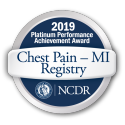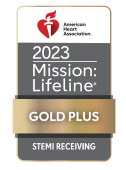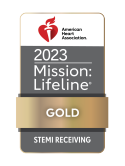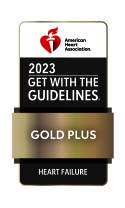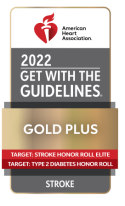The UCSF-John Muir Health Jean and Ken Hofmann Cancer Center at the Behring Pavilion is now open. LEARN MORE >
Heart Failure Program
John Muir Health provides ongoing education, support, and management to patients who have been diagnosed with heart failure from inpatient consultations to our outpatient heart failure resource centers. Heart failure patients receive assistance through every phase of cardiac care. Our highly skilled team includes cardiologists, hospitalists, clinical nurse specialists, dietitians, physical therapists and cardiovascular nurses.
What Is Heart Failure?
If you have been diagnosed with heart failure or know someone who has, you're not alone. Nearly five million Americans of all ages are currently living with this condition, with over 900,000 new cases diagnosed each year. Although there is no known cure, new treatments are helping patients with heart failure to live full, enjoyable lives.
Heart failure is a common, progressive condition in which the heart's pumping power weakens, slowing the flow of blood throughout the body. Heart failure doesn't mean that the heart has stopped working but rather that it has become inefficient. The condition increases pressure inside the heart and lungs, which can result in a buildup of fluid in the feet, ankles, legs, and lungs.
Heart failure's many causes include:
- Coronary artery disease
- Scar tissue from past heart attack
- High blood pressure
- Heart valve disease
- Infection of the heart valves and/or heart muscle itself
The most common symptoms of heart failure are shortness of breath, swelling in legs and feet, fatigue, weight gain, and sometimes faster and irregular heartbeats. Heart failure is a serious problem that needs to be evaluated by a specialist. Untreated, heart failure will continue to worsen, damaging other vital organs.
Heart Failure Resource Centers
Located in Walnut Creek and Concord Medical Centers, these resource centers are managed by cardiac nurses certified in heart failure care. The heart failure nurses follow patients while in the hospital and then as outpatients via phone calls and resource center appointments. The resource center offers medication reconciliation, education and symptom management in consultation with the patient’s referring physician. The more your patients understand their disease, the better prepared they will be to manage it. Our heart failure program includes intensive patient education designed to help patients understand their disease and proactively manage their symptoms.
CardioMems Heart Failure Program
Our heart failure nurses follow patients who have been implanted with the CardioMEMS Heart Failure System. This system non-invasively measures pulmonary artery systolic, diastolic and mean pressures from a sensor implanted into the pulmonary artery and allows cardiologists to adjust treatment before the patient feels a worsening of their heart failure symptoms.
Treatment Options
Heart failure has no known cure, but new treatments are helping patients live full, enjoyable lives. The goals of treatment include:
- Identifying and treating any underlying cause of heart failure
- Managing and improving symptoms
- Improving the quality of life
- Slowing the progression of heart failure
A detailed medical history and physical examination will help identify the need for additional tests or procedures, which may include:
Electrocardiogram (EKG)
This test provides a graphic measurement of the heart rate and rhythm.
Chest X-Ray
A chest x-ray provides information about the size of the heart and the condition of the lungs.
Echocardiogram
Sound waves reveal information about the size and function of the heart, including problems with muscle contraction and heart valves.
Nuclear Scan
A radioactive substance is injected into a vein and then tracked by a nuclear camera. The scan shows how well the heart is pumping blood.
Cardiac Catheterization
A small, flexible tube is inserted into an artery in the groin or arm. After a special dye is injected, moving pictures trace the dye as it travels through the heart arteries. The images identify narrowed or blocked arteries and illustrate heart muscle movement.
Heart Failure Treatment
Heart failure patients can make many healthy choices to improve their symptoms and increase life expectancy. Regular contact with a doctor, including blood pressure checks, is paramount. A healthy diet, weight control, and limited salt intake are essential. Exercise can also have a positive impact.
Heart failure usually requires a treatment program that includes:
- Rest
- Proper diet
- Modified daily activities
- ACE inhibitors
- Beta blockers
- Digitalis
- Diuretics
- Vasodilators
ACE inhibitors and vasodilators expand blood vessels and decrease resistance, allowing blood to flow more easily and making the heart's work easier or more efficient. Beta blockers can improve the function of the left ventricle. Digitalis increases the pumping action of the heart, while diuretics help the body eliminate excess salt and water.
Cardiac Resynchronization Therapy
More than 40 percent of patients with heart failure have an arrhythmia that decreases the heart's ability to beat properly. Cardiac resynchronization therapy (CRT) can relieve heart failure symptoms by improving the coordination of the heart's contractions. CRT uses technology found in pacemakers and implantable cardioverter devices. CRT devices also protect an individual from slow and fast heart rhythms.
The ideal candidate for a CRT device is someone with:
- Moderate to severe heart failure symptoms, despite lifestyle changes and medication
- A weakened and enlarged heart muscle
- A significant electrical delay in the lower pumping chambers
Some CRT candidates have a high risk of sudden cardiac death from rapid irregular heart rhythms. For these patients, a special CRT device can stop potentially life-threatening rapid heartbeats with a jolt of electricity that restores the heart's normal rhythm. This device incorporates a standard implantable cardioverter defibrillator (ICD) with a CRT pacemaker, creating a "CRT-D" device. (The "D" refers to defibrillation.)
Awards & Recognition
We are dedicated to improving the health of the communities we serve with quality and compassion. This is demonstrated by our consistently high patient satisfaction ratings, and in the awards and accolades received from highly respected healthcare and accreditation organizations.
Cardiac Surgery 3-Star Rating
The Society of Thoracic Surgeons has developed a comprehensive rating system for the quality of Cardiac surgery among hospitals across the country. Approximately 12-15% of hospitals received the "3-star" rating, which denotes the highest category of quality. In the current analysis of national data, the performance of our hospital in three adult cardiac procedures was found to lie in this highest quality tier, thereby receiving an STS 3-star rating for:
*** Coronary Artery Bypass Grafting (CABG), Jan 2018 - Dec 2018
*** Aortic Valve Replacement (AVR), Jan 2016 - Dec 2018
*** Mitral Valve Repair/Replacement (MVRR), Jan 2016 - Dec 2018
Cardiac Surgery Program Rated Among Top 5 in California by Healthgrades
Our Cardiac Surgery program has been recognized among the top 5 in the state by Healthgrades, a leading online resource for consumers with comprehensive information about physicians and hospitals. Healthgrades’ Cardiac Surgery specialty award recognizes hospitals with superior clinical outcomes in heart bypass surgery and heart valve surgery. This recognition adds to the Concord Medical Center being recognized as one of America's Top 50 Hospitals for Cardiac Surgery by Healthgrades for four straight years.
2020 Chest Pain - MI Registry
Concord and Walnut Creek Medical Centers are the recipients of the Chest Pain – MI Registry Platinum Performance Achievement Award for 2020. The award recognizes commitment and success in implementing a higher standard of care for heart attack patients and signifies that JMH has reached an aggressive goal of treating these patients to standard levels of care as outlined by the American College of Cardiology/American Heart Association clinical guidelines and recommendations. To receive the Chest Pain – MI Registry Platinum Performance Achievement Award, JMH has demonstrated sustained achievement in the Chest Pain – MI Registry for eight consecutive quarters and has performed at the top level of standards for specific performance measures.
2023 Mission: Lifeline® - STEMI Receiving Center - Gold Plus
Concord Medical Center has earned the 2023 Mission: Lifeline® - STEMI Receiving Center - Gold Plus Award. Mission: Lifeline Receiving Hospital recognition is designed to showcase hospitals who provide reperfusion support for STEMI’s 24 x 7. These important facilities coordinate with a network of referring hospitals and emergency medical services to provide guideline directed STEMI and non-ST-elevation acute myocardial Infarction (NSTEMI) care for their community.
STEMI Receiving Centers earn Gold recognition for achieving 75% or higher compliance on all Mission: Lifeline STEMI Receiving Center quality achievement measures and 85% or higher composite adherence to all Mission: Lifeline STEMI Receiving Center quality achievement indicators and 50% performance for “arrival at first hospital to PCI” in ≤120 minutes for transfer patients for at least two consecutive year interval to improve the quality of care for STEMI patients.
2023 Mission: Lifeline® - STEMI Receiving Center - Gold
Walnut Creek Medical Center has earned the 2023 Mission: Lifeline® - STEMI Receiving Center - Gold Award.
2023 Get with the Guidelines® - Heart Failure
Walnut Creek and Concord Medical Centers have earned the 2023 Get With The Guidelines® - Heart Failure Gold Plus Quality Achievement Award.
Hospitals receiving Get With The Guidelines® Gold Plus Achievement Award have reached an aggressive goal of treating patients to core standard levels of care as outlined by the American Heart Association/American Stroke Association® for 2 consecutive calendar years or more. In addition, those hospitals have demonstrated compliance to an additional level of quality during the 24-month or greater period.
2022 Get with the Guidelines - Stroke
Walnut Creek and Concord Medical Centers have earned the 2022 Get With The Guidelines® - Stroke Gold Plus Quality Achievement Award and also qualified for recognition on the Target: Type 2 Diabetes Honor Roll and Target: Stroke Elite Honor Roll. Walnut Creek Medical Center has also qualified for recognition on the Target: Stroke Advanced Therapy Honor Roll.
Hospitals receiving Get With The Guidelines® Gold Plus Achievement Award have reached an aggressive goal of treating patients with 85 percent or higher compliance to core standard levels of care as outlined by the American Heart Association/American Stroke Association® for 2 consecutive calendar years. In addition, those hospitals have demonstrated 75 percent compliance to (four out of ten heart failure quality measures or four out of seven stroke quality measures) during the 12-month period.
Hospitals achieving Time to thrombolytic therapy ≤ 60 minutes in 85% or more of applicable acute ischemic stroke patients treated with IV tPA to improve quality of patient care and outcomes.
California Report on Coronary Artery Bypass Graft Surgery
The California Report on Coronary Artery Bypass Graft (CABG) Surgery 2019: Hospital and Surgeon Data was released by the California Office of Statewide Planning and Development. John Muir Health Concord Medical Center is the only hospital in the state performing significantly “Better” than the state average in isolated CABG mortality outcomes. This public report provides quality ratings for the 123 California-licensed hospitals performing coronary artery bypass graft (CABG) surgery in adults during 2018 and 2019, the most recent data published.
2020 U.S. News & World Report
For the fourth straight year, Concord Medical Center was one of only 37 hospitals nationwide (less than 1%) to receive a high-performing rating in the following adult procedures and conditions -- Abdominal Aortic Aneurysm Repair, Aortic Valve Surgery, Heart Bypass Surgery and Heart Failure. This year, Concord Medical Center was also rated as high-performing in Aortic Valve Surgery, and Transcatheter Aortic Valve Replacement (TAVR).
Blue Distinction Center Designation

Concord Medical Center is designated as a Blue Distinction Center for Cardiac Care. The Blue Distinction Center designation signifies that our Cardiac Care Program meets nationally established Selection Criteria by demonstrating expertise in delivering quality specialty care, safely and effectively.
Blue Distinction Centers (BDC) met overall quality measures, developed with input from the medical community. A Local Blue Plan may require additional criteria for providers located in its own service area; for details, contact your Local Blue Plan. Blue Distinction Centers+ (BDC+) also met cost measures that address consumers’ need for affordable healthcare. Each provider’s cost of care is evaluated using data from its Local Blue Plan. Providers in CA, ID, NY, PA, and WA may lie in two Local Blue Plans’ areas, resulting in two evaluations for cost of care; and their own Local Blue Plans decide whether one or both cost of care evaluation(s) must meet BDC+ national criteria. National criteria for BDC and BDC+ are displayed on www.bcbs.com. Individual outcomes may vary. For details on a provider’s in-network status or your own policy’s coverage, contact your Local Blue Plan and ask your provider before making an appointment. Neither Blue Cross and Blue Shield Association nor any Blue Plans are responsible for non-covered charges or other losses or damages resulting from Blue Distinction or other provider finder information or care received from Blue Distinction or other providers.

